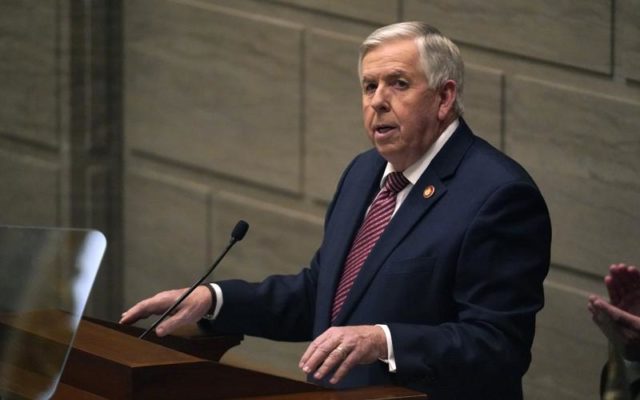THE EGGLESTON REPORT – A GREAT BILL FOR MISSOURI

HB 2090 started off as a simple, common sense bill to allow certain state employees get their paychecks every two weeks instead of every month. We passed the bill out of the House unanimously and sent it to the Senate on April 19. This week, we received back from the Senate their amended version. Often, what we get back from the Senate is loaded with less-than-stellar amendments. So imagine my surprise when I heard they had added three great provisions.
First, they included the big, one-time tax cut I wrote about a couple weeks ago. They pared it down from a billion dollars being refunded to Missouri taxpayers to a half-billion, but a half-billion is better than nothing. It works like this. Anyone making $150,000 or less will get up to $500 of their state income tax refunded automatically. The total for all taxpayer refunds cannot exceed $500,000,000. The Department of Revenue (DOR), which is the state’s version of the IRS, estimates most income tax payers will get between $300-$400 back per person (twice that per married couple).
Second, language clarifying that wedding venues are not to charge sales tax on some of their services was in the bill. A few years ago, DOR sent letters to wedding venues stating that their services were sales taxable, even though most thought they were not, and so they then owed a high amount of back taxes. Since the venues had not collected sales tax from their customers, they were now on the hook for the bill out of their own pocket causing a big financial hardship on those entrepreneurs. The legislature had been trying to pass a bill to help these wedding venue businesses for a few years, but it could never seem to make it to the finish line.
Last, a provision states that no state or local government employer can force their employees to take a Covid vaccination as a condition of their employment was included. Over 30 House members filed various bills relating to Covid vaccination mandates. This is the only one to make it to the governor’s desk…so far.
HB 2090 has now completed its journey through the legislature. It will be up to the governor to either sign or veto the bill. This bill contains great, conservative legislation to lower income taxes, reduce government regulation, and champion individual freedom. One week remains in session. Hopefully more good legislation like this is passed before the final gavel falls.
As always, if you have any questions about any bill, please email me at [email protected]. Until next time, best wishes of safety, health, and prosperity to you and your family.
PICTURES FROM THE CAPITOL

My daughter Stefanie visits the House and joins me on the dais during debate (pictured with Speaker Vescovo)
FROM THE CAPITOL NEWS DESK
General Assembly Approves State Operating Budget that Makes Record Investments in Education and Infrastructure (HBs 3001 – 3013 and 3017, 3018, 3019, 3020)
Lawmakers have given final approval to a state spending plan that allocates record levels of funding to the state’s system of education, as well as to vital infrastructure projects such as roads, bridges, ports, water systems, and broadband. The budget plan also provides funding for programs that assist the state’s most vulnerable citizens, increases support for law enforcement and public safety, invests in the state’s workforce, and provides funding for a one-time economic recovery tax credit.
The House and Senate were able to compromise on the various differences in the plans approved by either side and send the state spending plan to Gov. Parson before the 6 p.m. deadline on Friday, May 6. The finalized version of the state operating budget contains approximately $44.7 billion in funding for the upcoming fiscal year that begins July 1. Additional appropriations bills approved by both chambers provide an additional $3.8 billion in funding for various capital improvement projects, as well as maintenance and repair of statewide facilities.
The House Budget Committee Chairman noted the budget also includes $500 million for a tax credit for Missouri taxpayers but also leaves more than $1 billion unexpended in the state treasury. He also noted there is more money coming into the treasury each day. “When we come back to session next year, we’re going to have a surplus in the state treasury and we’re going to be back in this same situation. And I’m going to advocate for taxpayers to get that money back because we don’t need it here in Jefferson City.” He added, “That could look like another round of repayments. It could look like a more permanent and lasting tax cut. I’d say sign me up for both of those.”
Record Investment in K-12 Education
The budget includes billions of dollars in new funding for K-12 education, which includes full funding for the state’s K-12 foundation formula. In total, House members approved nearly $10.4 billion in funding for K-12 education, which represents an increase of more than $2.9 billion in funding when compared to the previous budget. That increase is fueled primarily by an additional $2.4 billion in federal funding. The final version of the budget includes a funding boost of $214 million for school transportation, which provides an unprecedented level of funding for the school transportation formula.
The plan also takes significant steps to improve teacher pay in Missouri. It includes an additional $21.7 million to provide voluntary grants to local school districts, which can use the funds to help raise minimum teacher pay to $38,000 annually. Districts that opt in will see the majority of the increase funded by the state with the remainder funded by the district. The budget also allocates approximately $37.4 million to revive the Career Ladder program, which allows school districts to supplement the pay of teachers who take on additional duties. Additionally, the House plan invests $50 million in newly-created Close the Gap grants that will help Missouri families address the learning loss that occurred as a result of the pandemic.
Increased Funding for Higher Education
Lawmakers also boosted funding for the state’s institutions of higher learning. Core funding for Missouri’s institutions of higher learning is increased by nearly $43 million for the state’s four-year institutions, and by more than $8 million for the state’s community colleges. The budget also works to make college more affordable for Missouri students by increasing funding for the A+ Scholarship Program by $6 million and the Access Missouri Scholarship Program by $9 million, which fully funds the programs. The budget plan also includes an additional $3.5 million for the Bright Flight Scholarship program, which fully funds the program to provide full scholarships to the top 5 percent of test takers.
New Funding for Roads, Bridges, and Vital Infrastructure Projects
The finalized budget plan also makes a strong investment in the state’s transportation infrastructure. The spending plan allocates nearly $148 million in new funding from the State Road Fund, which is used for maintenance and construction for roads and bridges. The spending plan also includes $100 million for rural roads around the state that have fallen into disrepair. Additionally, the plan allocates $75 million in federal funds for the Transportation Cost-Share Program that partners with local municipalities to fund road repairs. The plan includes $25 million to help expand river ports in the state, an additional $25 million to expand the port in Jefferson County, and another $5 million for the port in New Madrid County. The state’s Amtrak service also receives $2.4 million in funding that will allow it to resume twice-daily rail service across the state.
Additionally, the plan provides a significant funding boost for water infrastructure projects throughout the state. In total, the budget provides more than $837 million for water infrastructure grants and loans. The budget also supports efforts to expand broadband access in Missouri. It includes $49.2 million in federal funds for the Rural Broadband Grant Program and $250 million in federal funding for the broadband infrastructure program.
Helping the State’s Most Vulnerable Citizens
The spending plan also provides substantive increases to many of the programs that serve the state’s most vulnerable citizens. The budget provides nearly $674 million for rate increases for home and community-based service providers, which allow Missourians who are most in need to stay in their homes. It also provides more than $29 million in new funding for the state’s Area Agencies on Aging (AAAs), and an additional $15.1 million for the AAAs to expand meal production capacity. The budget also increases funding for the Veterans Health and Care Fund by more than $6 million to help further support the state’s veterans’ homes. Additionally, it provides more than $16 million in funding for a mental health hotline program. Other funding increases include $20.5 million for the Children’s Trust Fund for grant programs that will assist children who are victims of sexual abuse and neglect, $2.2 million for Alternatives to Abortion, and $5.8 million for autism diagnostic centers.
Items of Note in the Budget:
- Full funding for the K-12 School Foundation Formula
- $214 million in new funding to fully fund the school transportation formula
- $1.9 billion in Elementary and Secondary School Emergency Relief (ESSER) III funds, as well as $443 million in ESSER II funds, for K-12 education
- $21 million for voluntary grants to help increase minimum teacher pay to $38,000 annually
- $37.4 million to bring back the Teacher Career Ladder program
- $50 million for Close the Gap grants, which would provide funds to Missouri families to address learning loss
- $9.4 million for a First Steps rate increase
- $5.8 million for a Parents as Teachers rate increase
- 5.4% core increases for funding for Missouri’s institutions of higher learning
- $6 million increase for the A+ Scholarship Program
- $9 million increase to fully fund the Access Missouri Scholarship Program
- $3.5 million increase to fully fund the Bright Flight Scholarship Program
- $31.5 million in new funding for the MO Excels Workforce Initiative, which facilitates development and expansion of employer-driven education and training programs
- $148 million allocated from the State Road Fund for construction and maintenance
- $100 million for repair of rural, low-volume routes
- $75 million in federal funding for the Transportation Cost-Share Program
- $7 million for public transit initiatives
- $837 million for water infrastructure grants and loans
- $55 million to expand ports in Missouri
- $49.2 million in federal funds for the Rural Broadband Grant Program
- $250 million for the broadband infrastructure program
- $15.9 million for Missouri One Start, which helps businesses recruit, onboard, and train job applicants during expansions
- $9.9 million in federal funds to the Division of Employment Security for fraud detection and prevention
- $1 million for the Energize Missouri Small Agricultural Grant
- $7 million for grants to drug task forces
- $3 million for grants for drug interdiction technologies
- $4.4 million in new funding for school safety applications
- More than $42 million for next generation 911 functionality
- $24.4 million to the Department of Corrections for health and mental health care
- $29 million in new federal funding for the state’s Area Agencies on Aging
- $15.1 million in funding for the Area Agencies on Aging to expand meal production capacity
- $6.2 million for the Missouri Veterans Health and Care Fund to increase funding for the state’s veterans’ homes
- $12.8 million for the Opioid Addiction Treatment and Recovery Fund for opioid antagonist distribution
- $5.8 million for autism diagnostic centers
- Nearly $3 billion in new funding for the state’s Medicaid program, which helps cover the cost of Medicaid expansion
- $674 million for rate increases for home and community-based service providers, which includes developmental disability provider rate increases
- $215.6 million in funding for new nursing home provider rates, which includes value-based payments to ensure the state is getting good results for the dollars invested
- $148 million for grants to federally qualified health centers
- $93.5 million in federal stimulus funds for the Low-Income Home Energy Assistance Program
- $10.3 million in new federal funding for the Low Income Weatherization Assistance Program
- $46 million for the Family First Prevention Services Act, which helps families safely keep their children at home
- $2.2 million in increased funding for the Alternatives to Abortion program
- $20.5 million for the Children’s Trust Fund for new programs that will assist children who are victims of sexual abuse and neglect
- $104.7 million for a new crime lab for the Missouri State Highway Patrol
- $83 million for a new training academy for the Missouri State Highway Patrol
- $104.5 million for the University of Missouri NextGen Precision Health Building
- $100 million for the State Emergency Management Agency for statewide response to COVID-19
- $126 million for digital government transformation of state information technology systems
- $500 million to provide tax relief to Missouri taxpayers
House and Senate Agree to Provide Tax Relief to Missouri Taxpayers (HB 3020 and HB 2090)
As the state has seen healthy revenue growth and an influx of federal dollars, House leaders have fought to give a significant portion of the funds in the state’s coffers back to Missouri taxpayers. This week the House’s plan to provide substantive tax relief took a significant step forward as the General Assembly approved $500 million in funding for a one-time economic recovery tax credit for Missouri residents who paid personal income tax in the state for 2021.
The plan, as it was originally approved by the House, called for $1 billion in tax relief. At the time, the House Budget Committee Chairman said, “It’s a simple notion. We’re going to create a tax credit that would send a billion dollars back to taxpayers and offset their state income tax liability.” However, the Senate did not agree to the plan as proposed by the House, and the two sides worked for a compromise position that could provide meaningful tax relief.
The final version of the plan caps the total amount of non-refundable tax credits issued at $500 million and allows anyone filing an individual Missouri personal income tax return to receive a credit equal to their tax liability up to $500. Married couples filing jointly would receive up to a $1,000 credit. The Senate added language that limits the credits to taxpayers earning $150,000 or less for an individual, or $300,000 or less for a married couple.
“I would prefer a billion over 500 million, but I won’t let perfect be the enemy of good,” said the House Budget Committee Chairman. “But again, it’s important to keep in mind, these are real tax dollars that are going back to real taxpayers. This is not a redistribution of wealth. This is giving money back to taxpayers when we’re in a situation where state government has too much of it.” He added, “$500 million back to Missouri taxpayers is something to celebrate.”
One supporter of the tax credit said, “When we have an excess like this, the government does not need more money because it is not our money. It is the people’s money. We’re giving it back and every single person in this body should be proud of that.”
The House gave final approval on Friday to HB 3020, which contains the funding for the tax credit. House members also approved HB 2090, which contains the statutory language to create the credit program. Both measures now move to the governor’s desk where they will become law with his signature.
Honoring a National Hero (SCR 28)
The House approved a resolution this week that would ensure one of the nation’s greatest heroes is honored properly. House members gave final approval to SCR 28, which would urge the President to designate that the nation’s last surviving World War II Medal of Honor recipient receives a state funeral in the event of his passing.
Hershel Woodrow Williams of West Virginia is one of 353 Americans to receive the Medal of Honor during World War II and is the only recipient still alive today. The Medal of Honor is only conferred upon members of the United States Armed Forces who distinguish themselves through conspicuous gallantry and intrepidity at the risk of life above and beyond the call of duty while engaged in action against an enemy of the United States. Williams served in the United States Marine Corps and received his Medal of Honor for heroism above and beyond the call of duty during the Battle of Iwo Jima.
The resolution adopted by the House and Senate notes that Williams “served his country with conspicuous gallantry and intrepidity at the risk of life and therefore deserves the gratitude of the American people.” It calls on the President of the United States to designate a state funeral for Williams when he passes and says the event would be a way “for the American people to unite and honor all sixteen million soldiers, sailors, and airmen who served in our Armed Forces from 1941 to 1945.”
Other Legislation Given Final Approval by the General Assembly
SB 745 modifies the provisions related to public utilities. The bill allows an electrical corporation to make one application to the Public Service Commission to either approve rate schedules authorizing periodic rate adjustments outside of general rate proceedings or to defer and recover certain depreciation expense and return for qualifying electric plant recorded to plant-in-service on the utility’s books if the corporation has provided notice to the Commission to elect the opposite option. The act establishes the Task Force on Distributed Energy Resources and Net Metering, to conduct hearings and research information related to net metering. The act establishes the Task Force on Fair, Nondiscriminatory Local Taxation Concerning Solar Energy Systems to compile information on the taxation of solar energy systems and related issues. Under this act, electrical corporations, gas corporations, sewer corporations, and water corporations shall defer to a regulatory asset or liability account any difference in state or local property tax expenses actually incurred, and those on which the revenue requirement used to set rates in the corporation’s most recently completed general rate proceeding was based. The act modifies the definition of “weighted average cost of capital” for a provision relating to plant-in-service accounting. For each project in the specific capital investment plan on which construction commences on or after January 1st of the year in which the plan is submitted, and where the cost of the project is estimated to exceed $20 million, the electrical corporation shall identify all costs and benefits that can be quantitatively evaluated. The act modifies the criteria for electric customers to be considered for a discounted electric rate. The first discount of 35% is for customers with new load that is projected to be between 300 kilowatts but not more than 10 megawatts with a load factor of 45% and shall apply for 5 years. The second discount applies for new load that is projected to be more than 10 megawatts and have a load factor of 55% and the discount percentage shall be determined such that the applicant’s total bill is expected to provide revenues equal to 120% of the corporation’s variable cost, as described in the act, to serve the corporation’s accounts that are to receive the discount. Such discount shall apply for 10 years. The bill exempts from the definition of “retail sale” or “sale at retail” for the purposes of sales tax law the purchase by persons operating hotels, motels, or other transient accommodation establishments of certain utilities, which are used to heat, cool, or provide water or power to the guests’ accommodations, as specified in the bill, and which are included in the charge made for the accommodations. The bill also authorizes a sales tax exemption for all purchases by a Missouri company of solar photovoltaic energy equipment used to construct a solar photovoltaic energy system and all purchases of materials and supplies used directly to construct or make improvements to such systems, provided that such systems allow for energy storage, include advanced or smart meter inverter capacity, or allow for utility scale projects greater than 20 megawatts. The act adds individually identifiable customer usage and billing records for customers of a municipally owned utility, unless the records are requested by the customer or authorized for release by the customer, to the list of records that may be closed under the Sunshine Law. Supporters say the bill will help utilities with grid modernization and resiliency. The bill will also boost economic incentives for commercial users, which leads to economic development in the state. Supporters also note the bill would allow the Commission to track the property taxes between rate cases and to consider the changes in taxes when setting rates since changes in property taxes are not in the control of the utility company.
SB 886 modifies provisions relating to trusts, including the application of the rule against perpetuities to beneficiaries of certain trusts, interpretation of familial relationships described in trusts, distributions of income or principal from one trust to another trust, discretionary trusts, and settlors’ beneficial interests in certain trusts. For the purposes of interpreting a term of familial relationship in a trust, a child conceived or born during a marriage is presumed to be a child of the married persons unless a judicial proceeding is commenced before the death of the presumed parent and it is determined that the presumed parent is not the parent of the child. Under the act, a trustee, other than a settlor, who has discretionary power to make a distribution, may exercise such power by distributing all or part of the income or principal to a trustee of a second trust. The power may be exercised by distributing property from the first trust to one or more second trusts or by modifying the first trust instrument to become one or more second trusts. The act specifies that no creditor or other person making a claim against a beneficiary shall be entitled to any information relating to the trust’s assets or other trust records if distributions to the beneficiary are solely within the discretion of the trustee. Furthermore, this provision shall apply during the term of the trust, regardless of whether the beneficiary is also a potential remainder beneficiary of the trust. The act modifies provisions of current law relating to cemetery trust funds by providing that when net income from the trust funds is not sufficient to support, maintain, and beautify a cemetery, the county commission may use as much of the trust fund principal as the commission deems necessary for the purpose of basic maintenance to control the growth of weeds and grass.
HJR 116 is proposed Constitutional amendment that would, upon voter approval, establish a Missouri Department of the National Guard in charge of the Adjutant General appointed by and serving at the pleasure of the Governor, by and with the advice and consent of the Senate, charged with providing the state militia, upholding the Constitutional rights and liberties of Missourians, and other defense and security mechanisms as may be required. Supporters say most states have a Department of Defense or something similar to what Missouri would create with HJR 116. This allows for a more streamlined process for the chain of command. This bill would remove some of the bureaucracy and allow the Adjutant General to communicate directly with the Governor which will help with information management and response times for the National Guard.
HB 3015 is an appropriations bill that provides approximately $851 million in supplemental funding to various state departments for the current fiscal year that ends June 30.



